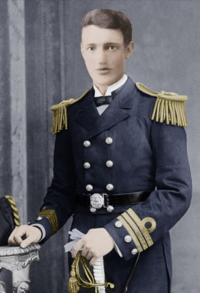Monarchy of Great Nortend
This article is incomplete because it is pending further input from participants, or it is a work-in-progress by one author. Please comment on this article's talk page to share your input, comments and questions. Note: To contribute to this article, you may need to seek help from the author(s) of this page. |
| King of the Kingdom of Nortend, Cardoby and Hambria | |
|---|---|
 | |
| Incumbent | |
 | |
| Alexander II since 30th April 2003 | |
| Details | |
| Style | His Majesty |
| Heir apparent | HRH The Prince of Rhise |
| Residence | Palace of St Michael'sgate, Lendert-with-Cadell |
The monarchy of Great Nortend, commonly known as the Erbonian or Nortan monarchy, is the semi-constitutional monarchy of the Kingdom of Nortend, Cardoby and Hambria, as well as of its colony of St Parth and Hastia. The current monarch and and Sovereign Lord of the Kingdom is Alexander II, who acceded to the throne on the 30th of April, 2003 after the death of Catherine II.
Constitutional and legal role
The Crown is the legal embodiment of the Kingdom as a nation or state, with the Sovereign from time to time as the physical and temporal manifestation of the institution. The Sovereign's image represents the sovereignty of the Great Nortend, and is thus used on coins of the official currency of the Realm, the pound marten, appears on stamps issued by the General Post Office, and is hung and displayed in Government buildings, churches, schools and private buildings across the country.
The Sovereign wields all of the legislative, executive, military, investigative and judicial powers with regards to his dominion, and could be in theory considered an absolute monarch inasmuch as he may do any thing he likes, subject only to the judgment of God. In practice, however, he takes little direct part in the day-to-day governance of the Kingdom, but rather delegates his temporal powers to the officials of the Curia Regis: legislative powers to the High Court of the Parliament, executive powers to the Privy Council and his Ministers, military powers to his Armies and Navies, investigative powers to determine fact to his Crown Inquisitors, and judicial powers to his judges and justices.
To an extent, however, the Sovereign remains deeply involved with the operations of the country when he desires. Declining of assent to bills presented by the Parliament is not uncommon, and the Sovereign has on many previous occasions directly ordered executive action or determined particular judicial cases per sese.
Liegeance is the paramount consideration under the uncodified constitutional practice of Great Nortend. The principles of liegeance form a legal and moral relationship between Sovereign and subject, which is the basis of the law of the country. Crimes are considered to be wrongs against the Crown, and thus are punishable by the Crown in the criminal courts, and on a similar basis, wrongs against fellow subjects are considered to be punishable by the Crown in the common courts.
Religious role
The Sovereign holds the title and position as Supreme Governour of the Church Mundane and Vicar of Christ, being the head of the Christian Church of Nortend. He is not, however, considered a member of the clergy of the church.
The Sovereign appoints the primate of the Church, as well as the archbishops, bishops, deans, priests, deacons, subdeacons and archdeacons of the Church of Nortend. A mirror but connected legislative, executive and judicial structure is in place for the church, with a the Synod of Lendert, epispocal polity and ecclesiastical court system more or less interwined into the civil systems of government.
